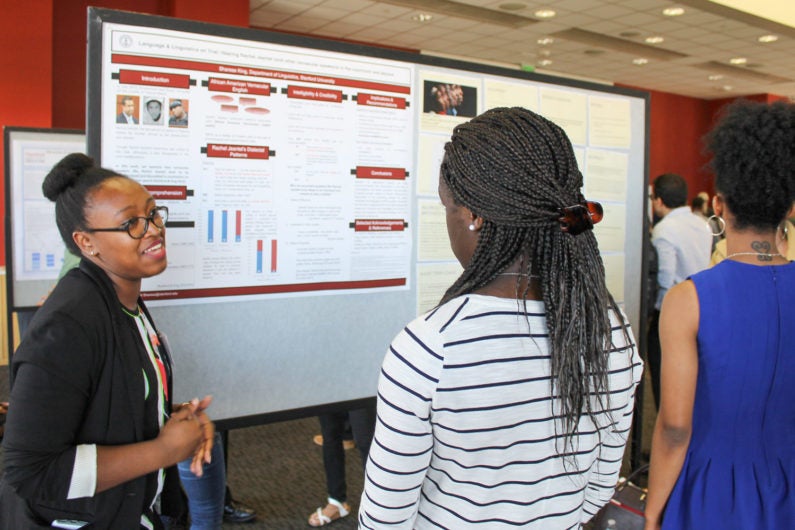Stanford unrolls welcome mat to prospective grad students from diverse backgrounds
Stanford will welcome prospective graduate students to campus Friday for Graduate Recruitment and Diversity Day, an annual event designed to help recruit outstanding scholars who would contribute to the diversity of their academic fields and to the university’s graduate community.
Stanford will welcome about 80 prospective graduate students to campus Friday for Graduate Recruitment and Diversity Day (GRAD Day), which introduces admitted graduate students and promising candidates to the resources, programs and supportive community that allow students from diverse backgrounds to thrive on the Farm.

Sharese King, a graduate student in linguistics, makes a presentation to prospective students during the 2017 Graduate Recruitment and Diversity Day. (Image credit: VPGE)
During GRAD Day, which will take place Friday, the prospective graduate students will meet members of Stanford’s faculty and staff, including senior diversity officers, as well as current graduate students. Academic departments will hold special events for the visitors.
The prospective students are considering more than 20 master’s and doctoral programs in four schools: the School of Earth, Energy & Environmental Sciences, the Graduate School of Education, the School of Engineering, and the School of Humanities and Sciences.
They are arriving from across the country – from California to Maine – and from China, Mexico, South Korea and the United Kingdom.
Each year, Stanford invites about 200 prospective graduate students to attend GRAD Day, which was designed to help recruit outstanding graduate students who would contribute to the diversity of their academic fields and to the university’s graduate community.
At Stanford, diversity is broadly defined and includes, but is not limited to, categories of culture, socioeconomic background, race, ethnicity, gender, gender identity, sexual orientation, disabilities, religion and life experience.
Seeking ever-more inclusive community
Patricia J. Gumport, vice provost for graduate education, said Stanford genuinely values the diverse life experiences and identities of its graduate students.
A diverse community of scholars asks unexpected questions and contributes divergent insights, pushing the forefront of knowledge in every field.
Patricia Gumport
Vice provost for graduate education
Stanford offers more than 200 graduate degree programs throughout its seven schools.
“Although graduate education is highly decentralized at Stanford, we are highly collaborative and aligned as one university that explicitly values diversity and seeks to be an ever-more inclusive community,” Gumport said. “A diverse community of scholars asks unexpected questions and contributes divergent insights, pushing the forefront of knowledge in every field.”
Gumport, who is also a professor of education, said the Office of the Vice Provost for Graduate Education (VPGE) works collaboratively with the entire university to broaden the participation and promote the academic success of all graduate students, including scholars who are underrepresented within research universities.
“Stanford is committed to preparing graduate students to gain the skills, knowledge and confidence to contribute and thrive – both while they are here at Stanford and after they graduate,” she said.
Gumport said Stanford has developed a variety of programs designed to promote diversity within its graduate student community, including two competitive fellowships offered by the VPGE Office: Enhancing Diversity in Graduate Education Fellowship Program for incoming students and Diversifying Academia, Recruiting Excellence Doctoral Fellowship Program for students who want to prepare for academic careers.
Diversifying graduate education
Noé-Pablo Lozano, associate dean for diversity at the School of Engineering, said GRAD Day reflects the commitment of faculty, departments, senior leadership and the VPGE Office to attract and recruit graduate students who will diversify the Stanford community.
Lozano, chair of this year’s GRAD Day, said graduate students from underrepresented backgrounds who choose Stanford will be offered extra academic advising and guidance on how to be successful at the university.
“At the same time, we will promote access to Stanford’s diversity initiatives, contacts, resources and services that complement our robust graduate student resources,” he said.
Lozano said Stanford can help affect the diversity of the national workforce by advancing diversity in graduate education.
“We wish to emulate the success Stanford has accomplished at the undergraduate level, where our diversity looks like the talent pool available in the nation,” he said.
GRAD Day workshop, reception, tours
The GRAD Day program includes a workshop on the adviser/advisee relationship – a topic of critical importance to prospective graduate students.
“In a doctoral program, if you do not have at least one faculty mentor, you will not obtain a doctorate, get accepted into a laboratory or scholarly area, or advance to PhD candidacy,” Lozano said. “Most students from underrepresented backgrounds are minimally informed about the faculty-driven PhD culture and how to access it, especially since almost all of them are the first in their family and extended family to receive a PhD.”
GRAD Day includes an evening reception in the Mackenzie Room of the Huang Engineering Center, an event that Gumport said is imbued with a spirit of celebration.
“It is always a heart-warming event, as members of the university community from across the campus are eager to talk with prospective students about all that Stanford has to offer and what makes Stanford genuinely distinctive,” she said.
The GRAD Day program also includes tours of the eight student community centers on campus – including the Black Community Services Center, El Centro Chicano y Latino, Queer Student Resources and the Markaz Resource Center – as well as guided tours of campus. The program extends into Saturday with breakfast, followed by tours of graduate residences and an informal trip to San Francisco.
